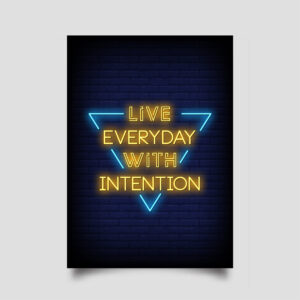 “Intentional” is my focus word/concept for 2025 for two reasons. First, being intentional addresses my need to act more deliberately. Second, intentionality aligns directionally with my last four annual words: “recalibrate;” “pause;” “nuance;” and “explicit.”
“Intentional” is my focus word/concept for 2025 for two reasons. First, being intentional addresses my need to act more deliberately. Second, intentionality aligns directionally with my last four annual words: “recalibrate;” “pause;” “nuance;” and “explicit.”
If you detect a theme, you’re absolutely right. These words — especially intentional, recalibrate and pause — encourage mindfulness before acting, primarily around time commitments.
In effect, the words serve as prompts for me to stop and widen my perspective to see and analyze situations more thoroughly rather than sleepwalk or act impulsively. As a result, I can better assess the implications of potential actions and then intentionally make decisions.
By practicing being intentional, I plan to sharpen my focus, improve the quality of my thinking and work, and reduce stress, which can lead to greater personal fulfillment. Being intentional can bring about other advantages too. For instance, when you think and act with greater purpose, you can enjoy these benefits. You’re able to:
- achieve clarity about what matters most to you
- manage your time better
- make better decisions
- reach your goals faster
- reduce overwhelm
- decrease distractions
- strengthen relationships, including de-escalating conflicts
- grow and develop in meaningful ways
- build self-confidence
- experience more gratitude
- and there’s more!
Sounds like a great wish list, right? And many or all of these benefits are achievable if you apply yourself, as I’ve seen with many of my coaching clients — as well as experienced myself when I remember to be intentional.
So how can you be intentional, especially consistently Intentional? These three steps help immensely.
1.Start by making sure you’re aligning your actions, including daily activities, with your values as much as possible. And make sure your goals as much as possible match your values. This values/goals/action alignment contributes to your sense of purpose and gives you energy. Just think how drained you can feel when you’re doing things you feel you ought to do, rather than want to do. (Yes, we all have to do things we don’t love doing; that’s one of the responsibilities of being an adult. However, being more aware of your values and the extent to which your goals and actions are aligned with your values can help you see how well you’re on a purposeful course rather than wandering through life.)
For example, one of my coaching clients with young children who values family time told me she was starting every work week drained. As we talked, she realized it wasn’t because of the kids; it was fighting work fires. She was frequently responding to weekend calls from her doctoral students about their experiments and other projects. The students’ questions may be important, but were they urgent? No. As we talked, my client realized she could intentionally set boundaries for herself. She told her students she wasn’t going to answer phone calls (or texts) over the weekend unless they experienced an emergency. She immediately was able to reclaim her time, enjoy her family, and re-energize on her weekends.
2. Be prepared to reframe situations to ensure you’re being true to your new goals and intentions. For instance, for many of us, a full calendar is a source of pride as it signifies high productivity and superb performance. However, if your intent is to find more time for reflecting, resting, re-energizing or whatever, more white space on your calendar will paint a prettier picture than one of crammed texts of various, even random appointments. Learn to love this new picture of open air! You may find that you need to look at other aspects of your routines in different ways to align with new ways of doing and being.
3. Take time, ideally, once a week or more to reflect on how you’re doing. For example, when you plan your upcoming week, ask yourself how well your appointments reflect your values and your necessary commitments. You also can look for space to take more intentional actions that fit you and your goals. A few questions that can be helpful to ask are: “To what extent are the things demanding my time also deserving my attention? Will they move me in the direction I want to go? And if not, what do I do about them?”
It’s now time to close here and be more intentional about my choices and actions in other aspects of my life. However, writing this blog helped me practice being more intentional and maybe inspired you and others to be too. By the way, another advantage of intentional behavior is that it sets an example for others to adopt a more purposeful approach, which can create positive changes in their lives too.
Before concluding here though, let’s check in with you. What about you? Have you selected a focal word or phrase for 2025? If so, please share and inspire others!

0 Comments